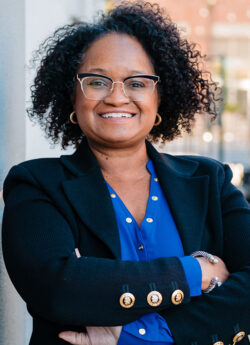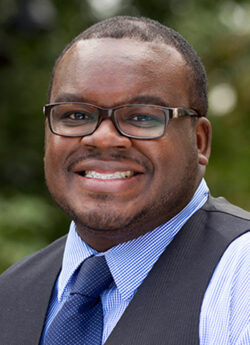Racial equity in Alzheimer’s research focus of $7 million in grants

The burden of Alzheimer’s disease doesn’t fall on all communities equally. Black Americans face about double the risk of developing the devastating neurodegenerative disease than non-Hispanic white Americans do.
The factors that place Black people at elevated risk remain poorly understood, partly because Black people historically and systematically have been underrepresented in Alzheimer’s studies. Without a sufficiently large pool of Black study participants, it is not possible to investigate thoroughly the myriad social and other factors that put Black people at risk.
Two new grants awarded to researchers at Washington University in St. Louis will support efforts to bring more Black Americans into Alzheimer’s research studies to better understand the health challenges facing the community. Joyce Balls-Berry, PhD, an associate professor of neurology at the School of Medicine, has received a $3.4 million grant to recruit Black Americans and other members of under-resourced communities into a registry for research studies. Darrell Hudson, PhD, an associate professor of public health at the Brown School, and Ganesh M. Babulal, PhD, OTD, an assistant professor of neurology at the School of Medicine, have jointly received a $3.7 million grant to investigate risk factors for cognitive decline among Black Americans. Both studies are supported by the National Institute on Aging of the National Institutes of Health (NIH).
Building a diverse registry that benefits participants and researchers

Balls-Berry’s work builds on the groundwork laid by the African American Advisory Board at Washington University’s Charles F. and Joanne Knight Alzheimer Disease Research Center. Established in 2000 by national civil rights activist Norman Seay and John C. Morris, MD, the Harvey A. and Dorismae Hacker Friedman Distinguished Professor of Neurology, the advisory board has steadily expanded African American participation in Alzheimer’s studies at Washington University by promoting culturally sensitive and appropriate outreach strategies.
But much work remains to be done, Balls-Berry said. The number of Black volunteers is still relatively small, and she worries about overburdening them with too many requests for study participation. Consequently, she is launching the COEQUAL Registry (Creating Opportunities to Increase Health Equity and Equality for Persons at risk of Alzheimer Disease and Related Dementias). The plan is to use a patient- and community-engaged framework to recruit, enroll and retain 2,000 new volunteers.
Historically, members of under-represented groups too often have been left out of the design and planning process for biomedical studies, resulting in research that does not meet their needs, Balls-Berry said. To ensure that the registry will benefit participants and their communities as well as researchers, she is working closely with civic leaders and patient and family advocates to determine every aspect of the registry: which data to collect, how to collect and utilize them, how to give participants and the community access to data in the registry, and how to report to the community findings from studies based on the data.
“As a Black woman scientist, I always think about the fact that many times our voices aren’t heard,” Balls-Berry said. “I used to teach ‘Intro to Community-Engaged Research,’ and I would tell my students, ‘You drop down into the community. You ask a ton of questions. You draw some blood. You give out a few gift cards as a thank you. You write some papers. You get promoted. But you never come back to present your findings. You’ve never asked the question, ‘How can this data be used by the local community to inform policy changes in those areas?’ That’s how we don’t want to do it. We want to consider the issues around the cultural impact of the science that we’re doing. We want to apply our findings in ways that won’t cause more disparities, won’t cause stigmatization. There are human beings behind each of the numbers in a study.’”
Finding factors that place Black people at risk
Meanwhile, Hudson, a social scientist, and Babulal, a health science researcher, are taking a multidisciplinary and multidimensional approach to studying the factors that put Black people at risk of Alzheimer’s disease. Their study blends cutting-edge biomedical research with community-engaged research to investigate how mental health and other factors influence overall health and affect the risk of cognitive decline among Black Americans. The study will use the NIA Health Disparities Research Framework to guide assessment of the environmental, sociocultural, behavioral and biological factors at play. Their study is known as ARCHES, for Aging Research Characterizing Health Equity via Social determinants.
The researchers are recruiting a diverse group of 300 Black St. Louisans to represent a wide range of life experiences among people in the Black community. To recruit such a large and diverse participant group, the researchers have set up a community advisory board and partnered with community organizations to help develop communication messages and design strategies for reaching people from a variety of geographic and sociodemographic backgrounds.

“There’s a lot of heterogeneity within the Black American population socioeconomically, geographically, in experiences and so on,” Hudson said. “Throughout St. Louis and other communities like it, people live in essentially separate and not equal social and physical environments, and that cascades across the life course, leading to premature death and many different illnesses. We think it’s important to obtain a truly representative sample to investigate how these physical and social environmental factors can affect Black Americans and their risk of Alzheimer’s disease.”
Hudson and Babulal are investigating how factors such as depression, stress, access to health care, experience with discrimination, and employment affect cognitive function and molecular biomarkers of Alzheimer’s disease. The results could yield insight into the roots of Black Americans’ elevated risk for the disease and potentially identify new strategies to reduce that risk.

“We don’t have a full view of how all these factors impact health and aging in America,” Babulal said. “We know social experiences affect the body, but we’re still working out how, exactly, environment and health behaviors interact with biology to influence the risk of cognitive impairment. We need to know the causal mechanisms so we can find ways to intervene and reduce these health inequities that have been present for decades and longer.”
Source: Read Full Article